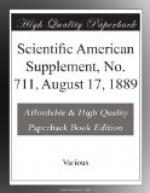* * * * *
WATER AS A THERAPEUTICAL AGENT.
By F.C. ROBINSON, M.D.
My experience in the use of water in almost every disease occurring in this climate has long since satisfied me that it is less objectionable and produces quicker and better results than any other treatment, and can be used when all other medication is contra-indicated. Drinking water should be pure, uncontaminated by animal or vegetable impurities, and given ad libitum, unless, in rare instances, it should cause vomiting or interfere with the capability of digesting food. If children are comatose or delirious, as they frequently are in typhoid fever, give water to them regularly, or force it upon them, if they refuse to take it, as I was obliged to do with a child of six years just recovering from that fever.
It is my custom to allow cold drinks of water in all cases of measles whenever patients desire it, and I am satisfied that it aids the early appearance of the rash, and certainly is cooling and grateful to the patient. Hot drinks or vile and nauseous teas are unnecessary in this disease, and should be discarded as useless, odious, and disgusting. If congestion of the lungs or any intercurrent inflammation occurs, or the rash is much delayed, a hot water bath or the old reliable corn sweat will break up the complication with amazing rapidity, and if the head is kept cool, will not generally be unacceptable to the patient.
Hot baths reduce temperature by causing free perspiration afterward, and cold packs reduce it by cooling the surface sufficiently long to reduce the heat of the blood, and, if used judiciously, seldom fail of success. I have reduced the temperature four degrees in two hours by wrapping around a child a sheet wet with tepid water, and no other covering. Cold packs are sometimes objectionable, because of their depressing effects, and should only be used to reduce high temperature and when there is no congestion or inflammation of any of the vital organs of the body.




